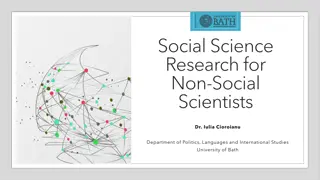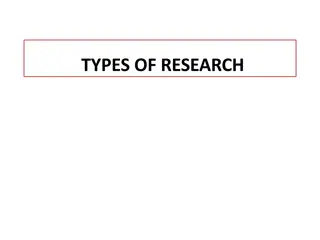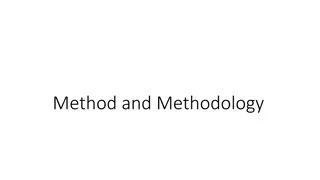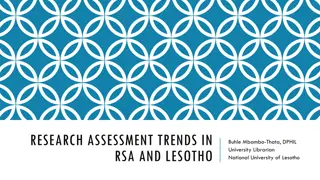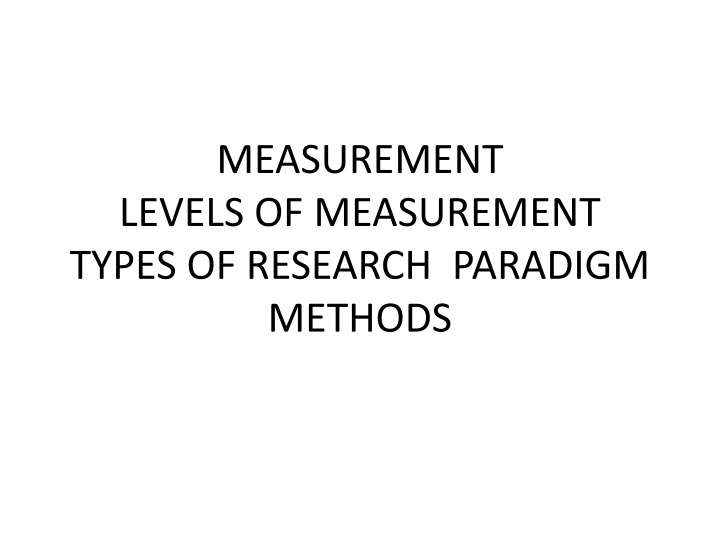
Levels of Measurement in Research Paradigms
Explore the levels of measurement in research paradigms, from nominal to ratio, and learn how different types of data are classified and analyzed. Understand the significance of nominal, ordinal, interval, and ratio levels in measuring social phenomena and variables. Discover the importance of assigning numerical values and maintaining distinct order in data analysis processes.
Download Presentation

Please find below an Image/Link to download the presentation.
The content on the website is provided AS IS for your information and personal use only. It may not be sold, licensed, or shared on other websites without obtaining consent from the author. If you encounter any issues during the download, it is possible that the publisher has removed the file from their server.
You are allowed to download the files provided on this website for personal or commercial use, subject to the condition that they are used lawfully. All files are the property of their respective owners.
The content on the website is provided AS IS for your information and personal use only. It may not be sold, licensed, or shared on other websites without obtaining consent from the author.
E N D
Presentation Transcript
MEASUREMENT LEVELS OF MEASUREMENT TYPES OF RESEARCH PARADIGM METHODS
LEVELS OF MEASUREMENTS Social phenomena can be measured in various ways, such as by asking questions or noting behaviour/observation
MEASUREMENT. Do you save money? Yes / No If yes, how much? "Child labour in our country must be banned". Strongly Agree Agree Undecided Disagree Strongly Disagree
LEVELS OF MEASUREMENT 1.Nominal Gender:M/F 2.Ordinal - 3.Interval and 4.Ratio
Nominal Level of Measurement Lowest level of measurement. A variable is classified into several nominal subclasses. Gender has two nominal subclasses, male and female.
Nominal Level of Measurement Numbers assigned to nominal subclasses at this level of measurement represent serial order only. The numbers do not have mathematical values. Hence no mathematical function is possible with nominal data.
ORDINAL LEVEL OF MEASUREMENT In ordinal level of measurement the relative positions of objects or persons with respect to some characteristics are defined. Higher level than nominal level because in addition to being mutually exclusive (feature of nominal level of measurement) the categories have a fixed order. Level of education measures on ordinal scales.
INTERVAL LEVEL OF MEASUREMENT In thermometer 60 degrees is 10 degrees more than 50 degrees. Measurement of intelligence by IQ tests is another example. Each point on the scale is mutually exclusive and the distances between IQ scores of 90 and 100 and 100 and 110 are equal. However, we cannot say that a person with an IQ of 130 is twice as intelligent as a person with an IQ of 65.
Ratio Level of Measurement Highest level of measurement. Ratio level contains the characteristics of nominal level (mutually exclusive) ordinal level (fixed order) and interval level (equal spacing, in addition to an absolute zero).
SCALING TECHNIQUES LIKERT RELIABILITY VALIDITY 10
LIKERT SCALES SIX STEPS : 1. Compiling possible scale items 2. Administering items to a random sample respondents 3. Computing a total score for each respondent 4. Determining the discriminative power of items 5. Selecting the scale items, and 6. Testing reliability. 11
RELIABILITY That quality of measurement method that suggests that same data would have been collected each time in repeated observations of the same phenomena. Reliability Measures: Cronbach s Alpha Split-half Reliability 12
VALIDITY A descriptive term used of a measure that accurately reflects the concept that it is intended to measure Measures of Validity: Face Validity Criterion Validity Content Validity Construct Validity 13
ATTITUDE TOWARDS GANDHIAN VALUES Please read the following statements carefully. Check the response and tick ( ) the response which exactly reflects your view.
S. No. Statements Strong ly Agree Agre e Undeci ded Disagr ee Strong ly Disagr ee Forgiveness is the sign of weakness and the revenge is the sign of courage. 1 Forgiveness is more than revenge. With the use of impure means it is impossible to get at pure ends. 2. 3 Disclosing his weakness and faults the individuals loses his prestige. Any fair and foul means should be adopted to realize a noble goal. A man who follows his principles honestly can get respect from his opponents. 4 5 6
TWO CATEGORIES OF RESEARCH R e se a rc h B a sic A p p lie d 3/21/2025 16
A Paradigm on Research Research Individual Basic Applied Collaborative Action Research Schoolwide Evaluation Quantitative Qualitative Descriptive Correlational Group Comparison Ethnography Case Study Historical Survey Observational Experimental Quasi- Ex Post Facto Experimental 3/21/2025 17
ASPECTS OF A UNIFIED THESIS Qualitative research Quantitative research RESEARCH PROBLEM Why, How? RESEARCH PROBLEM: who (how many)? what (how much)? Literature review: exploratory - what are the variables involved? constructs are messy research issues are developed Literature review: explanatory - what are the relationships between the variables which have been Previously identified and measured? hypotheses are developed Paradigm: Critical realism/interpretive Paradigm: Positivist Methodology: for example, case study research or action research Methodology: for example, survey or experiment 3/21/2025 18
QULAITATIVE RESEARCH PARADIGMS Cost Subjectivity and Generalizability Standards for Evaluating Qualitative Studies Contemporary Positivist Standards Social Constructivist Standards Empowerment Standards Research Ethics in Research Research Paradigms Naturalism Grounded Theory/Inductive Participatory Action Research Case Studies Qualitative Sampling Methods Strengths and Weaknesses of Qualitative Research Depth of Understanding Flexibility
QULAITATIVE RESEARCH METHODS The Various Roles of the Observer Relations to Participants: Emic (Insider)and Etic Perspectives Qualitative Interviewing Informal Conversational Interviews Interview Guide Approach Standardized Open-Ended Interviews Life History Feminist Methods Focus Groups Recording Observations
METHODS OF QUALITATIVE RESEARCH Participant-Observation 1. Ethnography(Field research)-Process of describing a culture or way of life from a folk peoples' point of view Photography Ethno methodology-study of commonsense knowledge, and is an ethnographic technique popularized by the sociologist Harold Garfinkel in the late 1960s. Dramaturgical Interviewing-a technique of doing research by role playing or play acting your own biases in some symbolic interaction or social performance. Sociometry Natural Experiment Case Study Unobtrusive Measures-gathering data in which subjects are not aware of their being studied 10. Content Analysis 11. Historiography 12. Secondary Analysis of Data 2. 3. 4. 5. 6. 7. 8. 9. 21 3/21/2025
Quantitative METHODOLOGY SURVEY LONGITUDINAL CROSS SECTIONAL, CORRELATION EXPERIMENTAL QUASIEXPERIMENTAL EXPOSTFACTO RESEASERCH 3/21/2025 22



